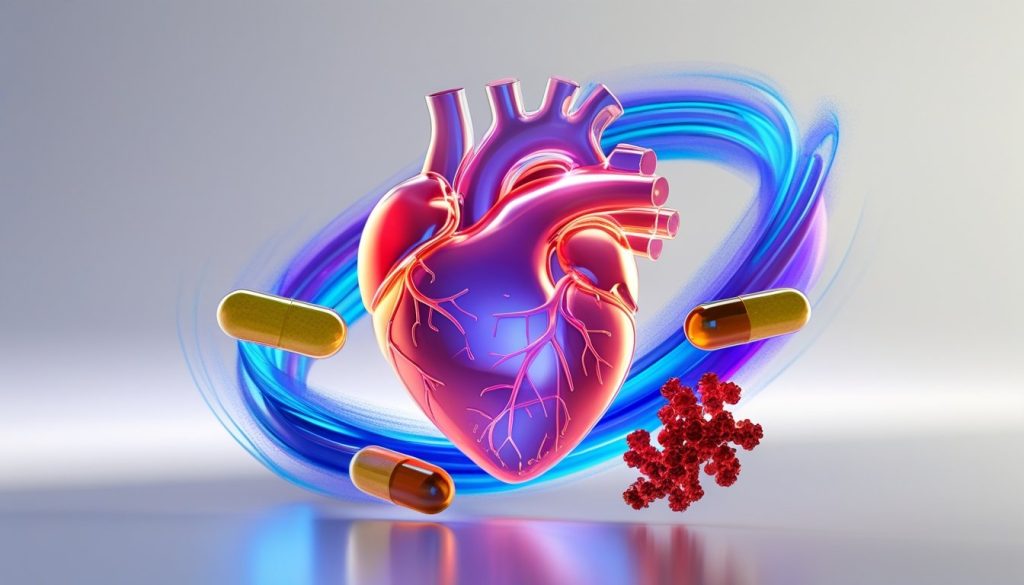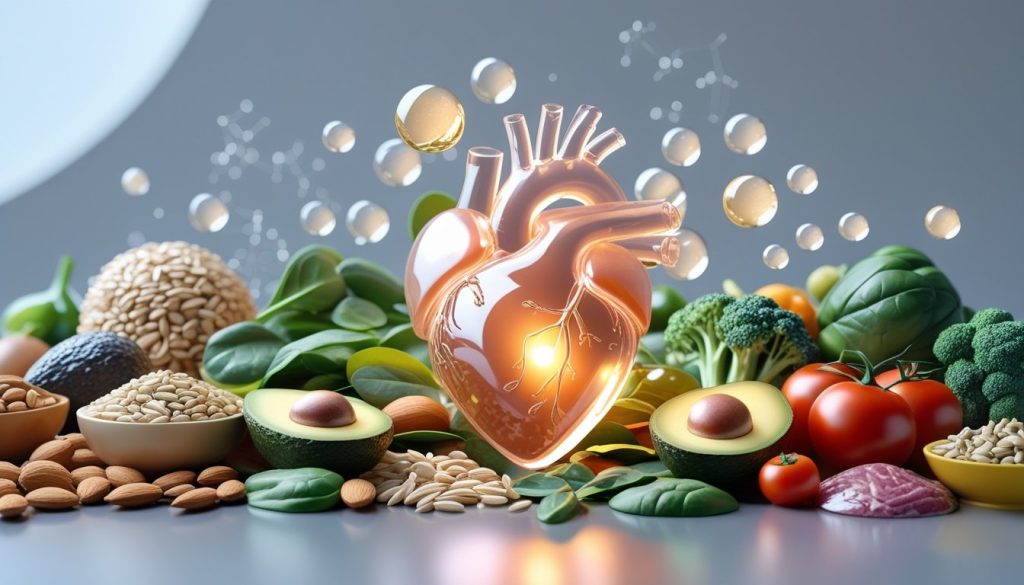Antioxidants for heart health represent one of the most researched areas in cardiovascular medicine, with mounting evidence showing their protective effects against heart disease.
Cardiovascular diseases remain the leading cause of death worldwide, but emerging research demonstrates that specific antioxidants can significantly reduce the risk of heart-related complications through their ability to combat oxidative stress and inflammation1.
These powerful compounds work by neutralizing harmful free radicals that damage blood vessels, reduce arterial flexibility, and contribute to atherosclerosis.
Understanding which antioxidants offer the most substantial benefits for cardiovascular protection can help individuals make informed decisions about their heart health strategy.
Why Antioxidants Matter for Heart Health
Oxidative stress plays a fundamental role in the development and progression of cardiovascular diseases, making antioxidants essential for maintaining optimal heart function1.
When free radicals accumulate in the cardiovascular system, they cause cellular damage that leads to inflammation, arterial stiffness, and the formation of atherosclerotic plaques. This process significantly increases the risk of heart attacks, strokes, and other cardiovascular events that can be life-threatening.
Research has consistently shown that individuals with higher dietary intake and blood concentrations of specific antioxidants experience reduced risks of coronary heart disease, stroke, and cardiovascular-related mortality13.
The protective mechanisms of antioxidants extend beyond simple free radical scavenging to include improving endothelial function, reducing inflammation markers, and supporting healthy blood pressure levels.
These compounds also help maintain the structural integrity of blood vessels and promote better circulation throughout the cardiovascular system.
However, it's important to note that not all antioxidants provide equal benefits for heart health. While some clinical trials with isolated antioxidant supplements have shown disappointing results, studies focusing on specific antioxidants with proven cardiovascular benefits continue to demonstrate significant protective effects1516.
The key lies in understanding which antioxidants offer the most substantial evidence-based benefits and how they can be effectively incorporated into a comprehensive heart health strategy.

Top 6 Antioxidants for Heart Health
Vitamin C: The Cardiovascular Guardian
Vitamin C stands as one of the most extensively studied antioxidants for heart health, with substantial evidence supporting its cardiovascular protective effects. Research indicates that higher dietary vitamin C intake significantly reduces the risk of coronary heart disease, stroke, and overall cardiovascular mortality13.
A comprehensive meta-analysis revealed that each 100-mg daily increment of dietary vitamin C intake was associated with a 12% reduction in coronary heart disease risk, an 8% reduction in stroke risk, and an 11% reduction in cardiovascular disease overall13.
The cardiovascular benefits of vitamin C extend beyond its antioxidant properties to include improvements in endothelial function, blood pressure regulation, and arterial flexibility9.
This essential nutrient helps maintain the structural integrity of blood vessels by supporting collagen synthesis and protecting against oxidative damage to the arterial walls.
Clinical studies have demonstrated that vitamin C supplementation can improve vascular function in individuals with existing cardiovascular risk factors, making it particularly valuable for those seeking to protect their heart health.
Natural food sources of vitamin C include citrus fruits, berries, bell peppers, broccoli, and leafy green vegetables.
While classical vitamin C deficiency is rare in developed countries, research suggests that maintaining optimal vitamin C levels through diet or supplementation may provide additional cardiovascular benefits beyond preventing scurvy5.
The evidence consistently supports the recommendation to increase vitamin C intake through whole food sources rather than relying solely on supplements for maximum cardiovascular protection.
Coenzyme Q10: The Cellular Energy Protector
Coenzyme Q10 (CoQ10) represents one of the most promising antioxidants for heart health, particularly for individuals with existing cardiovascular conditions.
This vitamin-like compound plays crucial roles in cellular energy production and serves as a potent antioxidant that protects against oxidative stress in the cardiovascular system2.
Clinical studies have demonstrated that CoQ10 supplementation can be beneficial as an adjuvant treatment for various cardiovascular diseases, including heart failure, atrial fibrillation, and myocardial infarction2.
The therapeutic potential of CoQ10 for heart health stems from its dual function in supporting mitochondrial energy production while providing antioxidant protection12.
In heart failure patients, where oxidative stress and mitochondrial dysfunction are prominent features, CoQ10 supplementation has shown particular promise in improving cardiac function and reducing cardiovascular-related complications.
Research indicates that CoQ10 can significantly reduce inflammatory and oxidative stress markers while supporting overall cardiovascular health2.
For diabetic patients, who face elevated cardiovascular disease risks, CoQ10 supplementation has demonstrated beneficial effects on metabolic and cardiovascular disease profiles8.
The compound's ability to improve cellular energy metabolism while providing antioxidant protection makes it particularly valuable for individuals with multiple cardiovascular risk factors.
Clinical evidence supports CoQ10 supplementation as part of a comprehensive approach to cardiovascular disease prevention and management.
Resveratrol: The Polyphenol Powerhouse
Resveratrol, a natural polyphenol found primarily in red wine, grapes, and berries, has garnered significant attention for its remarkable cardiovascular protective properties.
This powerful antioxidant demonstrates multiple mechanisms of action that benefit heart health, including improvements in cardiac diastolic and systolic function, reduction of atrial and left ventricular remodeling, and comprehensive anti-inflammatory effects3.
The compound's ability to activate cellular longevity pathways while supporting optimal energy metabolism in cardiomyocytes makes it particularly valuable for maintaining cardiovascular health.
Research has extensively documented resveratrol's favorable effects on pathological conditions related to cardiovascular diseases and their associated risk factors3.
The compound's anti-inflammatory and antioxidant properties work synergistically to protect the cardiovascular system from oxidative damage while promoting healthy vascular function.
Clinical studies have shown that resveratrol can improve endothelial function, reduce arterial stiffness, and support healthy blood pressure levels in individuals with cardiovascular risk factors.
The cardioprotective effects of resveratrol extend to its ability to modulate various signal transduction pathways involved in cell longevity and cardiac remodeling3.
This makes resveratrol particularly beneficial for individuals seeking comprehensive cardiovascular protection through natural means.
While red wine contains resveratrol, the compound can also be obtained through dietary sources like grapes, berries, and peanuts, or through targeted supplementation for those seeking therapeutic levels.

Quercetin: The Flavonoid Heart Protector
Quercetin, a naturally occurring flavonoid found in onions, apples, berries, and tea, demonstrates significant cardiovascular protective effects through multiple mechanisms of action.
This powerful antioxidant has shown particular promise in managing hypertension, with research indicating its ability to reduce both systolic and diastolic blood pressure through various pathways4.
Clinical studies have demonstrated that quercetin can reduce hypertension-induced aortic remodeling, oxidative stress, and inflammatory markers while improving overall vascular function.
The cardiovascular benefits of quercetin extend to its effects on heart failure, where the compound has shown ability to improve redox balance and mitochondrial homeostasis4.
Research indicates that quercetin can reduce myocardial hypertrophy by blocking harmful reactive oxygen species and reversing mitochondrial dysfunction, making it particularly valuable for individuals with existing heart conditions.
The compound's ability to regulate multiple cellular pathways involved in cardiac protection demonstrates its comprehensive approach to cardiovascular health.
Quercetin also demonstrates significant antiplatelet effects, which contribute to its cardiovascular protective properties4.
The compound can inhibit platelet aggregation and thrombus formation through various mechanisms, potentially reducing the risk of cardiovascular events related to blood clot formation.
While more clinical trials are needed to fully establish optimal dosing protocols, current research strongly supports quercetin's role as a valuable antioxidant for comprehensive cardiovascular protection.
Alpha-Lipoic Acid: The Universal Antioxidant
Alpha-lipoic acid stands out among antioxidants for heart health due to its unique ability to function in both water and fat-soluble environments, earning it the designation as the “universal antioxidant.”
This powerful compound demonstrates exceptional antioxidant properties by acting as a free radical scavenger while simultaneously inducing endogenous antioxidants such as vitamin E and glutathione6.
Research has shown that alpha-lipoic acid can effectively prevent cardiac dysfunction and provide primary prevention benefits for heart health.
Clinical studies have demonstrated alpha-lipoic acid's ability to significantly reduce inflammatory markers and oxidative stress parameters in cardiovascular tissues10.
The compound's effectiveness in decreasing TNF-α, IL-6, and other inflammatory mediators while increasing beneficial antioxidant enzymes makes it particularly valuable for individuals with cardiovascular risk factors.
Research indicates that alpha-lipoic acid administration can effectively prevent inflammation and oxidative stress in both ventricular and atrial heart tissues.
The cardiovascular protective effects of alpha-lipoic acid extend to its ability to improve glutathione redox status and enhance overall antioxidant defense systems10.
This comprehensive approach to cardiovascular protection makes alpha-lipoic acid particularly beneficial for individuals seeking to address multiple aspects of heart health simultaneously.
The compound's proven ability to provide both preventive and therapeutic benefits for cardiovascular conditions supports its inclusion in comprehensive heart health strategies.
Vitamin E: The Membrane Protector
Vitamin E, particularly in its α-tocopherol form, plays a crucial role in cardiovascular protection through its ability to protect cell membranes from oxidative damage.
Research has shown that higher blood concentrations of α-tocopherol are inversely associated with coronary heart disease, stroke, cardiovascular disease, and all-cause mortality13.
This fat-soluble antioxidant provides essential protection for cardiovascular tissues by preventing lipid peroxidation and maintaining membrane integrity throughout the cardiovascular system.
While some clinical trials with isolated vitamin E supplementation have produced mixed results, observational studies consistently demonstrate the cardiovascular benefits of adequate vitamin E intake through dietary sources1516.
The key lies in understanding that vitamin E works best as part of a comprehensive antioxidant network rather than as an isolated supplement. Natural food sources of vitamin E include nuts, seeds, vegetable oils, and leafy green vegetables, which provide the compound in its most bioavailable and effective forms.
Research indicates that vitamin E's cardiovascular protective effects are most pronounced when obtained through whole food sources that provide additional complementary nutrients13. The compound's ability to work synergistically with other antioxidants, particularly vitamin C, enhances its overall effectiveness for cardiovascular protection. This emphasizes the importance of obtaining vitamin E through a balanced diet rich in natural antioxidant sources rather than relying solely on supplementation.

How to Incorporate These Antioxidants for Heart Health
Incorporating these powerful antioxidants for heart health into your daily routine requires a strategic approach that emphasizes whole food sources while considering targeted supplementation when appropriate.
The most effective strategy involves building a foundation of antioxidant-rich foods that naturally provide these compounds in their most bioavailable forms.
This approach ensures optimal absorption and utilization while providing additional beneficial nutrients that work synergistically to support cardiovascular health.
A heart-healthy diet should prioritize colorful fruits and vegetables, which serve as primary sources of vitamin C, quercetin, and other beneficial flavonoids17.
Incorporating citrus fruits, berries, bell peppers, and leafy greens provides substantial vitamin C along with complementary antioxidants that enhance cardiovascular protection.
For CoQ10, include fatty fish, organ meats, and whole grains, while nuts and seeds provide excellent sources of vitamin E and alpha-lipoic acid. Red grapes, berries, and moderate amounts of red wine can supply resveratrol, though supplementation may be necessary for therapeutic levels.
When considering supplementation, it's essential to work with healthcare providers to determine appropriate dosages and ensure compatibility with existing medications. Research suggests that combination antioxidant approaches may be more effective than single antioxidant supplementation19.
This supports the strategy of obtaining multiple antioxidants through diverse food sources while using targeted supplements to achieve therapeutic levels of specific compounds like CoQ10 or resveratrol when indicated for cardiovascular protection.
Scientific Evidence and Clinical Studies
The scientific evidence supporting antioxidants for heart health comes from extensive research including epidemiological studies, clinical trials, and mechanistic investigations that collectively demonstrate their cardiovascular protective effects.
Large-scale observational studies have consistently shown that individuals with higher dietary antioxidant intake experience significantly reduced risks of cardiovascular events and mortality13. These findings provide compelling evidence for the importance of antioxidants in cardiovascular disease prevention and management.
Clinical trials have provided mixed results for antioxidant supplementation, with some studies showing significant benefits while others demonstrate neutral or even adverse effects1516.
However, this variability often reflects differences in study design, antioxidant selection, dosing protocols, and patient populations rather than indicating a lack of efficacy for all antioxidants. Studies focusing on specific antioxidants with proven cardiovascular benefits, such as CoQ10 for heart failure or vitamin C for endothelial function, continue to demonstrate positive outcomes.
The most compelling evidence comes from studies that examine antioxidants in the context of overall dietary patterns rather than isolated supplementation13. Research consistently shows that diets rich in fruits, vegetables, nuts, and other antioxidant-containing foods provide superior cardiovascular protection compared to Western diets low in these compounds. This supports the recommendation to prioritize whole food sources of antioxidants while using targeted supplementation judiciously for specific cardiovascular conditions or risk factors.
Safety and Dosage Considerations
When incorporating antioxidants for heart health, understanding appropriate dosages and safety considerations is essential for maximizing benefits while minimizing potential risks. Most antioxidants obtained through whole food sources are generally safe and well-tolerated, with the body's natural regulatory mechanisms helping to maintain appropriate levels. However, supplementation requires more careful consideration of dosing, timing, and potential interactions with medications or other supplements.
For vitamin C, the recommended dietary allowance ranges from 75-90 mg daily, though research suggests that higher intakes up to 500-1000 mg daily may provide additional cardiovascular benefits for some individuals9.
CoQ10 supplementation typically ranges from 100-300 mg daily for cardiovascular support, with higher doses sometimes used under medical supervision for specific conditions2. Resveratrol supplementation generally ranges from 250-500 mg daily, though optimal dosing continues to be researched3.
It's crucial to consult with healthcare providers before beginning any antioxidant supplementation regimen, particularly for individuals taking medications or with existing health conditions. Some antioxidants can interact with certain medications, including blood thinners, chemotherapy drugs, or other supplements.
Additionally, individuals with specific health conditions may require modified dosing or monitoring to ensure safety and effectiveness. Professional guidance helps ensure that antioxidant strategies complement rather than interfere with existing treatments.

Frequently Asked Questions
1. Which antioxidants for heart health are most effective for preventing cardiovascular disease?
Research shows that vitamin C, CoQ10, and resveratrol have the strongest evidence for cardiovascular protection, with studies demonstrating significant reductions in heart disease risk and improved cardiac function.
2. Can antioxidants for heart health replace prescription medications?
No, antioxidants should complement, not replace, prescribed cardiovascular medications. Always consult your healthcare provider before making any changes to prescribed treatments.
3. How long does it take to see benefits from antioxidants for heart health?
Some benefits, like improved endothelial function, may be observed within weeks, while long-term cardiovascular protection develops over months to years of consistent antioxidant intake.
4. Are there any side effects from taking antioxidants for heart health?
Most antioxidants from food sources are safe, but high-dose supplements may cause side effects or interact with medications. Professional guidance helps minimize risks.
5. Should I take individual antioxidant supplements or combination formulas for heart health?
Research suggests that combination approaches may be more effective than single antioxidants, as they work synergistically to provide comprehensive cardiovascular protection.
6. Can I get enough antioxidants for heart health from food alone?
A diet rich in fruits, vegetables, nuts, and whole grains can provide substantial antioxidant benefits, though therapeutic levels of certain compounds like CoQ10 may require supplementation.
7. Do antioxidants for heart health work differently in men versus women?
While both genders benefit from antioxidants, some research suggests there may be differences in optimal dosing or specific compound effectiveness between men and women.
8. Are natural antioxidants for heart health better than synthetic ones?
Natural antioxidants from whole food sources are generally preferred due to better bioavailability and the presence of complementary nutrients that enhance effectiveness.
9. Can antioxidants for heart health help with existing cardiovascular disease?
Yes, research shows that specific antioxidants like CoQ10 can provide therapeutic benefits for individuals with existing heart conditions, though medical supervision is essential.
10. What's the best time of day to take antioxidant supplements for heart health?
Timing varies by antioxidant, but many are best taken with meals to enhance absorption. Fat-soluble antioxidants like CoQ10 should be taken with foods containing healthy fats.
Conclusion: Protecting Your Heart with Evidence-Based Antioxidants
The evidence overwhelmingly supports the role of specific antioxidants for heart health in both preventing and managing cardiovascular disease. The six antioxidants discussed – vitamin C, CoQ10, resveratrol, quercetin, alpha-lipoic acid, and vitamin E – each offer unique mechanisms of cardiovascular protection that work together to support optimal heart function.
By incorporating these powerful compounds through both dietary sources and targeted supplementation when appropriate, individuals can take proactive steps toward comprehensive cardiovascular protection.
The key to success lies in adopting a holistic approach that prioritizes whole food sources while strategically using supplements to achieve therapeutic levels of specific antioxidants when indicated. This strategy provides the most comprehensive protection while minimizing potential risks associated with high-dose supplementation.
Remember that antioxidants work best as part of an overall heart-healthy lifestyle that includes regular exercise, stress management, and other evidence-based cardiovascular protection strategies.
To further enhance your understanding of nutritional support for cardiovascular health, explore our comprehensive guide on amino acids and their role in heart health, where you'll discover additional nutrients that complement antioxidants in supporting optimal cardiovascular function and overall wellness.

